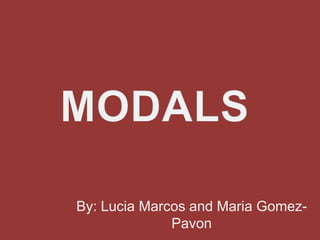
Modals l y m
- 1. By: Lucia Marcos and Maria Gomez- Pavon
- 2. CAN • We use can when we want to express possibility, ability ,permission and to make request. * Afirmative sentences : subject + can + verb in infinitive I can cook lentils because my grandmather taught me. * negative sentences: subject +can´t + verb in infinitive I can´t play rugby because I´m very dumb. * Interrogative sentences: can + subject + verb in infinitive Can I open the window ? It is very hot.
- 3. COULD *We use could when we want to express possibility, ability ,permission and to make request in the past. *Afirmative sentences: subject+ could+ verb in infinitive Mike could ride his bike when he was six years old. *negative sentences: subject+ couldn´t + verb in infinitive. Shanon couldn´t go to the party because she had to study. *interrogative sentences: could+ subject+ verb in infinitive. Could Shanina cook and talk in the phone at the same time?.
- 4. SHOULD * We use should to give advice * Afirmative sentences: subject+ should + verb in infinitive. You failed your exam so you should study harder. * Negative sentences: subject+ shouldn´t +verb in infinitive. you shouldn´t smoke because it´s bad for your lungs. * Interrogative sentences: should + subject + verb in infinitive. • I had an argument with my mum. What should I do?
- 5. MUST • We use must to express obligation. • Afirmative sentences: subject+ must+ verb in infinitive. • You must go to sleep at 10:00 . • Negative sentences: subject+ musn´t + verb in infinitive. • You musn´t smoke in this restaurant.
- 6. HAVE TO • we use have to to express obligation. • Afirmative sentences: subject+ have to + verb in infinitive. • You have to turn off your mobile phone in the mass. • Negative sentences: subject+ don´t /doesn´t have to+ verb in infinitive • You don´t have to cheat in the exams. • Interrogative sentences:do/ does + subject+ have to+ verb in infinitive • Do you have to send a message?
- 7. MAY AND MIGHT • We use may to show possibility in the future, to ask for and give or deny permission in a formal speech. • We use might to show possibility in the future . • Afirmative sentences: subject+ may/might+ verb in infinitive. • Dan may/might go shopping with his mum later today. • Negative sentences:subject+may /might not+ verb in infinitive • You may/might not use your phone in class. • Interrogative sentences: may + subject+ verb in infinitive. • May I go to the bathroom?.
- 8. EXERCISES • Choose the right modal verb • It's a hospital. You _______ smoke • I _____speak Arabic fluently when I was a child and we lived in Morocco • The teacher said we_____ read this book for our own pleasure as it is optional. But we______ read it if we don't want to. * Take an umbrella. It ______ rain later. * Drivers_______ stop when the traffic lights are red. * _____ I ask a question? Yes, of course.